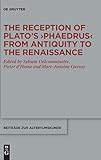The Reception of Plato’s ›Phaedrus‹ from Antiquity to the Renaissance / ed. by Sylvain Delcomminette, Pieter d'Hoine, Marc-Antoine Gavray.
Material type: TextSeries: Beiträge zur Altertumskunde ; 384Publisher: Berlin ; Boston : De Gruyter, [2020]Copyright date: ©2020Description: 1 online resource (VI, 286 p.)Content type:
TextSeries: Beiträge zur Altertumskunde ; 384Publisher: Berlin ; Boston : De Gruyter, [2020]Copyright date: ©2020Description: 1 online resource (VI, 286 p.)Content type: - 9783110683639
- 9783110683974
- 9783110683936
- online - DeGruyter
- Issued also in print.
| Item type | Current library | Call number | URL | Status | Notes | Barcode | |
|---|---|---|---|---|---|---|---|
 eBook
eBook
|
Biblioteca "Angelicum" Pont. Univ. S.Tommaso d'Aquino Nuvola online | online - DeGruyter (Browse shelf(Opens below)) | Online access | Not for loan (Accesso limitato) | Accesso per gli utenti autorizzati / Access for authorized users | (dgr)9783110683936 |
Frontmatter -- Contents -- Introduction -- The influence of Plato’s Phaedrus on Aristotle’s Rhetoric -- Galen’s Self-Understanding and the Platonic Phaedrus -- The Causality of the Self-Moving Soul: Platonic Responses to the Objections of De Anima I 3 -- Beauty and Recollection: from the Phaedrus to the Enneads -- The Phaedrus as Testimony of a Theology of the Gentiles according to the School of Alexandria -- The Reception of Plato’s Phaedrus in Early Christianity -- Echoes of the Phaedrus in Augustine’s Discussion with Porphyry -- Plato’s Phaedrus as a Manual for Neoplatonic Hermeneutics: The Case of the Anonymous Prolegomena to Plato’s Philosophy -- Plato’s Phaedrus as a Manual for Neoplatonic Hermeneutics: Inspired Poetry and Allegory in Proclus -- How to Lead Souls to Beauty: Hermias on the Unity of the Phaedrus -- Proclus on the Climax of the Phaedrus (247c6–d1) -- Michael Psellos’ Exegesis of the Expedition of Gods and the Chariot Flight of the Soul -- The Phaedrus in the Renaissance: Poison or Remedy? -- Bibliography -- Index locorum -- Index nominum
restricted access online access with authorization star
http://purl.org/coar/access_right/c_16ec
This volume explores the tremendous influence of Plato’s Phaedrus on the philosophical, religious, scientific and literary discussions in the West. Ranging from Plato’s first readers, over the Church Fathers and the Platonic commentators, to Byzantine and Renaissance thinkers, the papers collected here introduce the reader to the first two millennia of the dialogue’s reception history. Thirteen contributions by both junior and established scholars study the engagement with the Phaedrus by such major figures as Aristotle, Galen, Origen, Clemens of Alexandria, Plotinus, Augustine, Proclus, Psellus, Ficino, Erasmus, and many others. Together, they cover the wide range of topics discussed in the dialogue: the value of myth and allegory, religion and theology, love and beauty, the soul and its immortality, teaching and learning, metaphysics and epistemology, rhetoric and dialectic, as well as the role and the limits of writing. By placing the dialogue in this broad perspective, the volume will appeal to readers interested in the Phaedrus itself, as well as to classicists, literary theorists, and historians of philosophy, science and religion concerned with the dialogue’s reception history and its main protagonists.
Issued also in print.
Mode of access: Internet via World Wide Web.
In English.
Description based on online resource; title from PDF title page (publisher's Web site, viewed 25. Jun 2024)


